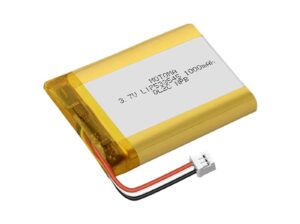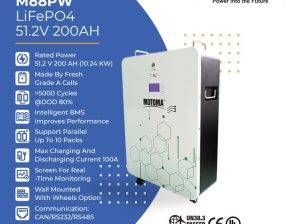Low Temperature LiPo Battery: Why Important for Low-Temp Applications
Lithium Polymer batteries are rechargeable batteries widely used in various applications due to their high energy density, lightweight, and long cycle life. They are commonly used in portable electronic devices such as smartphones, laptops, and tablets, as well as in electric vehicles and renewable energy systems. Low Temperature LiPo Battery is a type of Lithium Polymer battery that has been designed to operate in low-temperature environments.
Low Temperature LiPo Battery have several advantages over traditional Lithium Polymer batteries when it comes to operating in cold temperatures. In this blog post, we will explore what low-temperature Lithium Polymer batteries are, how they work, their advantages, and some of their applications.
What is Low Temperature LiPo Battery?
Lithium Polymer batteries are made up of several layers of electrodes and electrolytes that are stacked together. The electrodes are usually made of a carbon material, and the electrolytes are made of a lithium salt dissolved in an organic solvent. When the battery is charged, lithium ions are released from the positive electrode and move through the electrolyte to the negative electrode, creating a flow of electrons. This flow of electrons generates an electrical current that can be used to power various devices.
Low Temperature LiPo Battery is a variation of Lithium Polymer batteries that have been optimized to operate in low-temperature environments. These batteries have been designed with several features that allow them to operate at temperatures as low as -50°C. They are often used in applications where traditional Lithium Polymer batteries would fail due to the cold temperature.
How do Low Temperature LiPo Battery work?
Low Temperature LiPo Battery work similarly to traditional Lithium Polymer batteries and same design, but with some modifications. One of the main modifications is using a different type of electrolyte. Conventional Lithium Polymer batteries use a liquid electrolyte, which can freeze at low temperatures. Low-temperature Lithium Polymer batteries use a solid-state electrolyte that does not freeze at low temperatures. This solid-state electrolyte maintains the battery’s performance even in cold temperatures.
Another modification is the use of a different type of separator. The separator is the layer that separates the positive and negative electrodes in the battery. Traditional Lithium Polymer batteries use a porous separator that allows the electrolyte to flow freely between the electrodes. Low-temperature Lithium Polymer batteries use a non-porous separator that prevents the electrolyte from freezing at low temperatures.
Low Temperature LiPo Battery also uses a different type of electrode material. The electrode material used in low-temperature Lithium Polymer batteries is usually a high-capacity material optimized for cold temperatures. This electrode material maintains the battery’s capacity even in freezing temperatures.
Advantages of Low Temperature LiPo Battery
Low-temperature Lithium Polymer batteries have several advantages over traditional Lithium Polymer batteries when it comes to operating in cold temperatures. Some of these advantages include:
- Improved performance: Low Temperature LiPo batteries have been optimized for use in cold temperatures, which means that they can maintain their performance even at low temperatures. This is important in applications where reliable performance is critical, such as in military equipment, aerospace systems, and remote monitoring devices.
- Longer cycle life: Low Temperature LiPo Battery has a longer cycle life than traditional Lithium Polymer batteries. This means that they can be charged and discharged more times without losing their capacity. This is important in applications where the battery is used frequently, such as in electric vehicles and renewable energy systems.
- Better safety: Low-temperature Lithium Polymer batteries are generally safer than traditional Lithium Polymer batteries. This is because they use a solid-state electrolyte that is less prone to leakage and thermal runaway. This is important in applications where safety is critical, such as in medical devices and transportation.
- Greater energy density: Low-temperature Lithium Polymer batteries have a higher energy density than traditional Lithium Polymer batteries. This means that they can store more energy per unit volume or weight. This is important in applications where space and weight are limited, such as in portable electronic devices and unmanned aerial vehicles.
- Improved cold start: Low Temperature LiPo Battery can provide a higher current output at low temperatures than traditional Lithium Polymer batteries. This means that they can provide more power to start cold engines or devices. This is important in applications where quick startup is critical, such as in vehicles and backup power systems.
Applications of Low Temperature LiPo Battery
Low-temperature Lithium Polymer batteries have a wide range of applications, especially in environments where traditional Lithium Polymer batteries fail due to cold temperatures. Some of the applications of low-temperature Lithium Polymer batteries include:
- Military and aerospace systems: Low-temperature Lithium Polymer batteries are commonly used in military and aerospace systems where reliable performance is critical, and the temperature can be extremely low. These batteries are used in communication equipment, navigation devices, and unmanned aerial vehicles.
- Renewable energy systems: Low-temperature Lithium Polymer batteries are used in renewable energy systems, such as solar power and wind power systems. These batteries store the energy generated by the renewable sources and provide backup power when the sources are not available.
- Electric vehicles: Low Temperature LiPo Battery is used in electric vehicles, such as electric cars and buses. These batteries provide power to the electric motors and store energy during regenerative braking.
- Medical devices: Low-temperature Lithium Polymer batteries are used in medical devices that need to operate in cold environments, such as refrigerated trucks and storage units for medical supplies and vaccines.
- Remote monitoring devices: Low Temperature LiPo Battery is used in remote monitoring devices, such as weather stations, sensors, and data loggers. These devices operate in harsh environments and need to be reliable and long-lasting.
Conclusion
Low Temperature LiPo Battery is a specialized Lithium Polymer battery designed to operate in low-temperature environments. These batteries have several advantages over traditional Lithium Polymer batteries when working in cold temperatures. They are commonly used in applications where reliable performance, safety, and energy density are critical. With the increasing demand for batteries that can operate in harsh environments, the development and use of low-temperature Lithium Polymer batteries are expected to continue to grow.
Comments (4)
You must be logged in to post a comment.



[…] do use LiPo batteries, there are also many other types of batteries that can power these devices. LiPo batteries are popular for handheld terminals because they are lightweight, have a high energy density, and can be recharged […]
[…] Monitor battery levels. It is important to know when the battery is running low. This can help prevent damage due to […]
[…] Safety: LiFePO4 batteries are much safer than lead-acid batteries due to their low flammability and low toxicity. This makes them a good choice for applications where safety is of paramount importance. […]
[…] important to consider the specific requirements of your application, such as energy density, power output, cycle life, operating temperature range, and safety […]